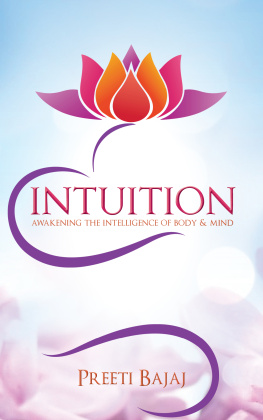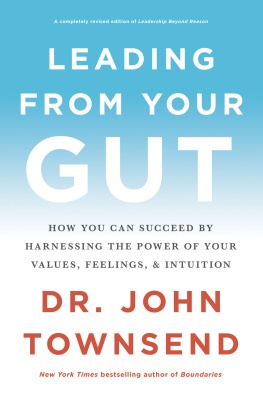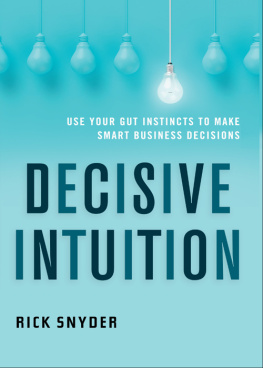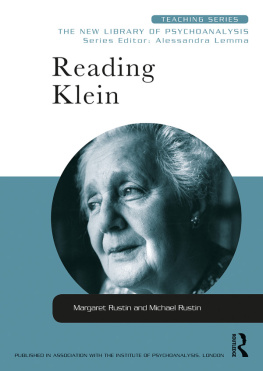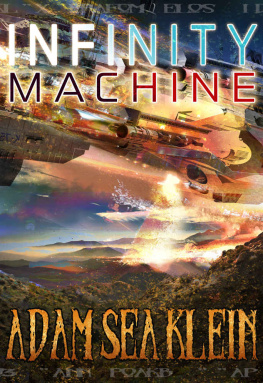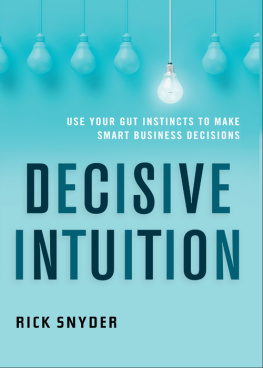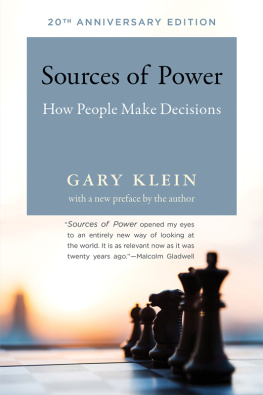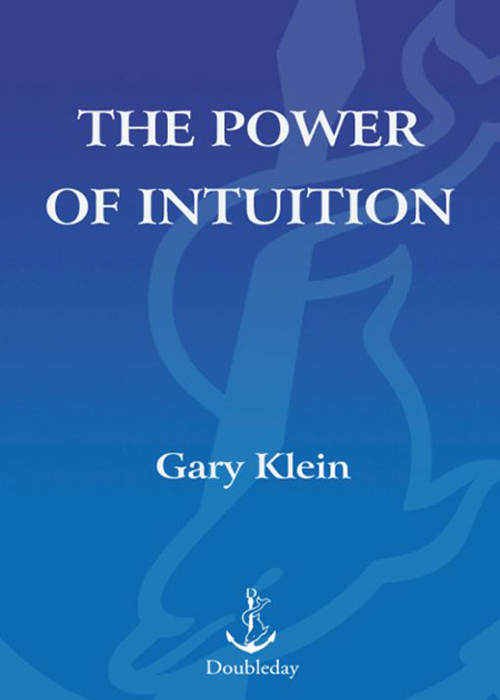
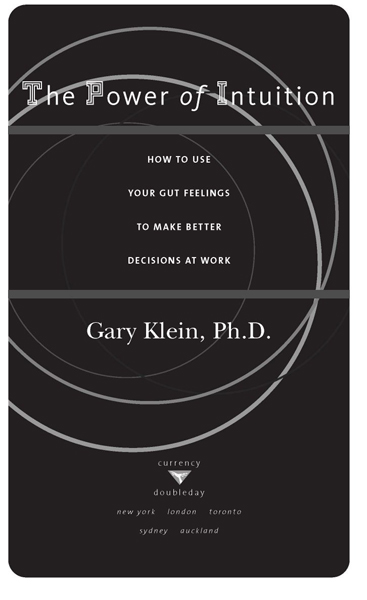
Table of Contents
For Helen
Acknowledgments
Ive been lucky to have the support and assistance of many friends and colleagues while I wrote this book. Each of them made an important contribution to my thinking and to the final version.
John Schmitt, a former Marine officer and currently a military consultant, was a key collaborator at every step. The work we did for the Marine Corps was the basis for the approach I have taken to train intuitive decision-making skills. John reviewed several drafts, describing at a conceptual level what he liked and what disappointed him, and making critical suggestions for how to improve the manuscript. Further, I was able to turn to John for assistance in the process of rewriting key sections. I am grateful for all of these things, and for his friendship.
Im also fortunate to have spent the last twenty-five years working in a company that has provided opportunities and capabilities that wouldnt have been available to me in most other organizations. My forty co-workers continually provide me with a blend of support, criticism, challenges, and new ideasa combination of academia and business.
Buzz Reed, the CEO of my company, read and reacted to drafts of the manuscript, provided advice whenever I asked, and ran interference in countless ways. I am thankful for having him as a friend and guide.
Several people from a variety of organizations provided opportunities to conduct a series of decision-training workshops in the last year in order to fine-tune some of the decision-training methods: Dick Buckles, Paula Sydenstricker, Alyse McConnell, Jeanne Beauregard, Stephen Blatt, Will Hildesley, Wendy Philleo, Jennifer Holthaus, and Connie Gillan.
Four colleagues were generous enough to recount specific examples of their own intuitive decision making: Jerry Kirby, Lia DiBello, Bob Baker, and Ollie Malone.
Mike McCloskey shared the lessons he learned in training decision-making skills to different groups. For almost a decade, Larry Miller has both encouraged me to find ways to train decision-making skills and has given me opportunities to conduct that training with the firefighting community. Paul Van Riper and Tony Wood had enough confidence in my work to let me develop a decision-training program for the Marines. Pat Sweeney deserves thanks for useful discussions and strategizing about how to train decision making. Bill Breen and Tom Petzinger both helped me conceptualize ways to apply the ideas of intuitive decision making to the corporate sector.
I drew on a number of people who had the patience to review the entire manuscript, the dedication to document their comments, and the trust to share their impressions with me: Jenni Phillips, Laura Militello, Debbie Peluso, Rebecca Klein, Dale Thoms, and Ann Gabbard. Mike Doherty worked hard (if not always successfully) to keep me from turning this book into a polemic against decision analysis. Steve Gabbard helped me with specific examples throughout the book and also provided a manuscript review. Karl Weick offered his reactions at a critical point in the writing process.
I asked a few people to review and comment on portions of the manuscript, and got very useful suggestions: Ken Boff, David Garvin, Beth Crandall, Devorah Klein, and Rob Hutton.
Barb Law, as usual, stepped in at the end to thoroughly edit the manuscript, catching a frightening number of errors. I have been working with Barb for more than twenty years, and I know she always comes through where needed.
Veronica Sanger is a wonderful production specialist and readily agreed to take on the task of producing the manuscript for publication. Thanks to her unvarying professionalism, competence, and cheerfulness, we came through this with little difficulty. I am grateful for her help.
Gregg Slayton contributed most of the graphics, and Danyele Harris-Thompson provided me with library support. I also want to thank my agent, Katinka Matson and my publisher, Roger Scholl, for their help in conceptualizing the book. I was worried about the editing process, but Stephanie Land, at Doubleday, was as much a colleague as an editor and it was a privilege to work with her.
I also want to thank my wife, Helen, for her patience and understanding during a mental disappearing act that lasted more than a year. She knew what was in store for her when I started the writing process, and she was as supportive as she always is.
Preface
I never set out to study intuition, and I certainly never expected to write a book about it. There are already enough books on intuition to satisfy anyones reading habits. But the more research I did, and the more books I read, the more I realized that I needed to write this one. Here is what happened:
Almost two decades ago I conducted my first research project on decision making, studying firefighters to see how they could make high-stakes decisions in just a few seconds despite all the confusion and uncertainty inherent in their work.
I knew that the firefighters couldnt make their decisions by systematically comparing all of the possible ways to put out a fire because there wasnt enough time. I expected that they would only come up with two leading options, and compare these to each other. I was wrong. The firefighters, especially the more experienced ones, some with over twenty years of experience, usually just considered a single option.
In fact, to hear them describe it, they didnt really consider anything; they just acted. In our interviews with the firefighters, one of the most common statements my research team and I heard was, We dont make decisions. This amazed us because we watched them routinely making very challenging decisions, many with life-or-death implicationsand yet they were unaware they were doing it.
This was a finding I hadnt expected. I had stumbled onto the phenomenon of intuition, although I didnt realize it at the time. In fact, I was frustrated because the data had not come out the way I expected. Although I wasnt looking for intuition, intuition had found me.
My colleagues and I wondered if our results were somehow unique to firefighters but we soon found that people use their intuition to make decisions in every field we studied. Our research led us to the conclusion that we are all intuitive decision makers. Some of us are more skilled than others, certainly, and some are more specialized, but all of us rely on intuition. Even novices rely heavily on their intuitions, though not as frequently as experienced decision makers.
In retrospect, this shouldnt have surprised us. If you think about all the decisions we have to make in our personal and professional lives, it is obvious that we would never get through the day if we had to analyze every decision before we made it. Intuition is an essential, powerful, and practical tool. Flawed though it sometimes may be, we could not survive, much less excel, without it.
Equally important, through our research we came to appreciate that intuition is not a mystical gift that cant be explained. We discovered that the more experience people have in any particular field, the more they rely on intuition, and ultimately we learned that intuition is a natural and direct outgrowth of experience. I define intuition as the way we translate our experience into action. Our experience lets us recognize what is going on (making judgments) and how to react (making decisions). Because our experience enables us to recognize what to do, we can therefore make decisions rapidly and without conscious awareness or effort. We dont have to deliberately think through issues in order to arrive at good decisions.
Next page

